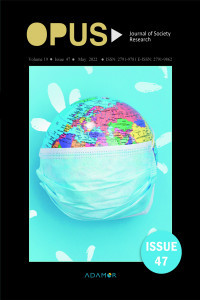Bryan S. Turner’ın Kuramı Çerçevesinde Kadın, Beden ve Toplum
Beden, toplum, Bryan Turner, postyapısalcılık, sağlık sosyolojisi
Women, Body and Society within the Framework of Bryan S. Turner’s theory
Body society, Bryan S. Turner, women, poststructuralism, sociology of health,
___
- Butler, J. (1988). Performative act and gender constitution: An essay in phenomenology and feminist theory. Theatre Journal, 40 (4), 519- 531.
- Butler, J. (2008). Cinsiyet belası. Başak Ertür (Çev.). İstanbul: Metis Yayıncılık.
- Descartes, R. (2018). Felsefenin ilkeleri. Mesut Akın (Çev.). İstanbul: Say Yayınevi.
- Descartes, R. (2011). Hakikatin araştırılması. Atakan Altınörs (Çev.). İstanbul: Paradigma Yayıncılık.
- Durkheim, E. (1984). The division of labor in society. The Free Press.
- Featherstone, M. (2005). Postmodernizm ve tüketim kültürü. Mehmet Küçük. (Çev.).İstanbul: Ayrıntı Yayınları.
- Foucault, M. (1993). Cinselliğin tarihi. Hülya Tufan (Çev.).İstanbul: Afa Yayınları.
- Foucault, M. (2003). Kliniğin doğuşu. Temel Keşoğlu (Çev.). Ankara: Doruk Yayımcılık.
- Foucault, M. (2011). Özne ve iktidar/Seçme Yazılar 2. Osman Akınhay ve Işık Ergüden (Çev.) İstanbul: Ayrıntı Yayınları.
- Foucault. M. (2015). İktidarın gözü/Seçme Yazılar 4. Işık Ergüden (Çev.). İstanbul: Ayrıntı Yayınları.
- Göle, N. (2000). İslamın yeni kamusal yüzleri: İslam ve kamusal alan üzerine bir atölye çalışması. İstanbul: : Metis Yayınları.
- Göle, N. (2002). Melez desenler: İslam ve modernlik üzerine. İstanbul: Metis Yayınları.
- Göle, N. (2004). Modern mahrem: Medeniyet ve örtünme. İstanbul: Metis Yayınları.
- Göle, N. (2007). Batı-dışı modernlik kavramı üzerine. Tanıl Bora ve Murat Gültekin (Ed.). Modern Türkiye’de Siyasi Düşünce Batıcılık. İçinde (ss. 56-67). İstanbul: İletişim Yayınları.
- Göle, N. (2009). İç içe girişler: İslam ve Avrupa. Ali Berktay (Çev.). İstanbul : Metis Yayınları.
- Göle, N. (2015). Gündelik yaşamda Avrupalı Müslümanlar. Zehra Cunillera (Çev.) İstanbul: Metis Yayınları.
- Honneth, A., ve Joas, H. 1988 [1980]. Social Action and Human Nature. Translated by Raymond Meyer. New York, NY: Cambridge University Press.
- Marcuse, H. (2013). One-dimensional man: Studies in the Ideology of Advanced Industrial Society. London: Routledge.
- Martin, E. (1989) The woman in the body: A cultural analysis of reproduc-tion. Milton Keynes: Open University Press.
- Merleau-Ponty, M. (1962). Phenomenology of perception. Trans.Colin Smith. London: Routledgea nd Kegan Paul.
- Parsons, T. (1951). Social system. London: Routledge and Kegan Paul.
- Shilling, C. (1993). The body and social theory. Londra: Sage.
- Turner, B. S. (1992). Düzenleyen bedenler: sağlık sosyolojisinde denemeler. Barış Özkul (Çev.). İstanbul: İletişim Yayınları.
- Turner, B. S. (2011). Tıbbi güç ve toplumsal bilgi. Ümit Tatlıcan (Çev.).Bursa: Sentez Yayıncılık.
- Turner, B. S. (2001). Body and society. Londra: Sage Yayınları.
- Williams, S.J. ve Bendelow G. (1998). The lived body: Sociological themes, embodied issues. London: Routledge.
- Yayın Aralığı: Yılda 6 Sayı
- Başlangıç: 2011
- Yayıncı: ADAMOR Toplum Araştırmaları Merkezi
Lise Öğretmenlerinin Örgütsel Ve Bireysel Değerleri
Otel Çalışanlarının Derin Davranışlarının Yaşadıkları İş-Aile ve Aile-İş Çatışması Üzerindeki Etkisi
Üniversitelerin İçinde Doğdukları Kentlere Yönelik Sosyal ve Kültürel İşlevleri: Adıyaman Örneği
Kadın Girişimciliği ve Cinsiyet-Rol Stereotipleri: Muş İli Örneği
İş Yolculuğunun Kavramsal Anlamda İncelenmesi ve Geri Çekilme Davranışları
Konteyner Elleçleme İçin Ekonometrik Tahminleme: ARMA Modeli Uygulaması
Bryan S. Turner’ın Kuramı Çerçevesinde Kadın, Beden ve Toplum
Toplum Desteği Alt Ölçeği’nin Üniversite Örnekleminde Psikometrik Özelliklerinin İncelenmesi
Selen DEMİRTAŞ-ZORBAZ, Nilüfer KOÇTÜRK
Gülay ARSLAN TOKER, Aylin SÖZER ÇAPAN
Aristoteles’te Uygulanabilir En İyi Rejim Olarak Anayasal Yönetim (Politeia) Kavramı
